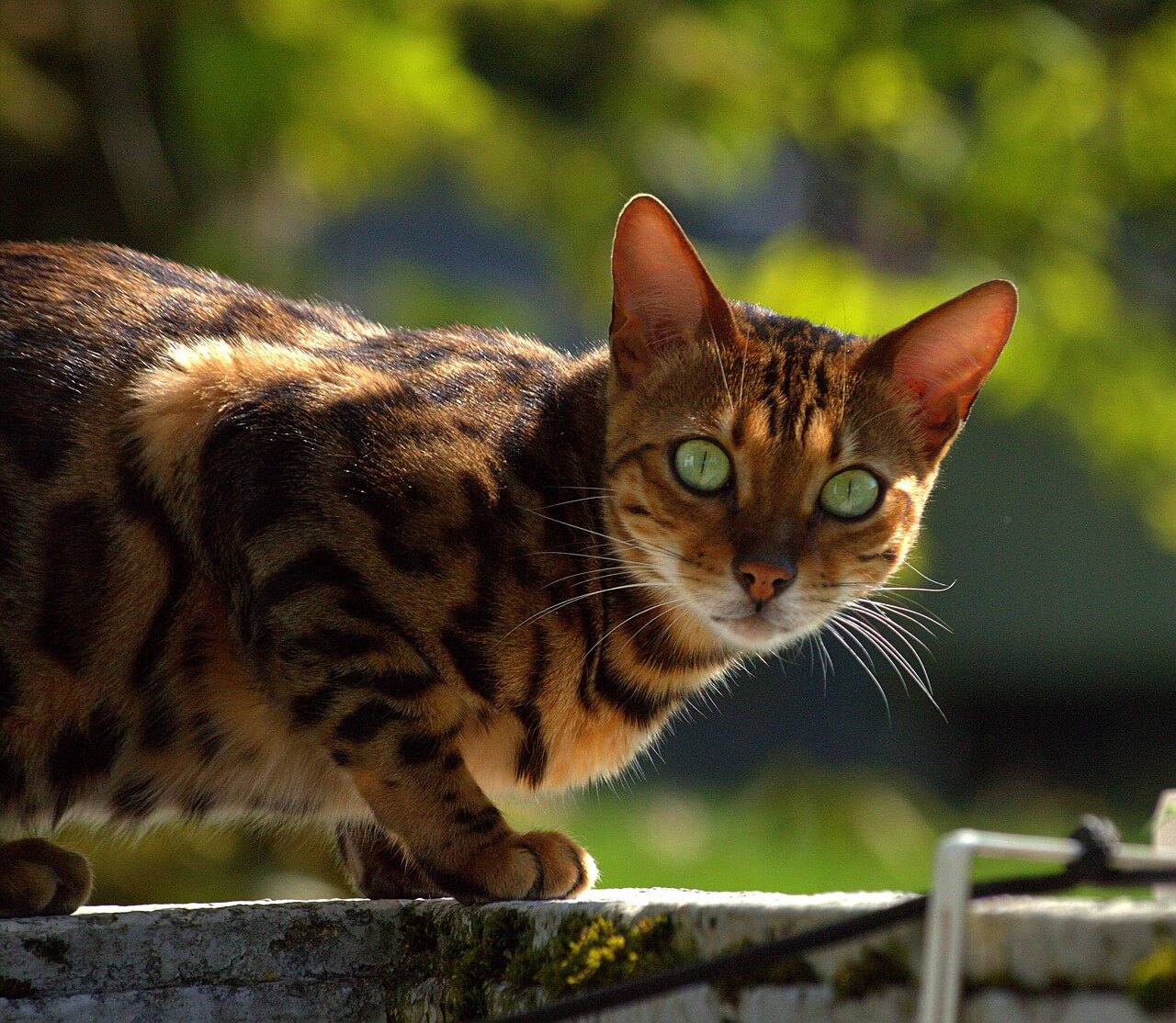Bengal Cats Exposed: The Stunning, Intelligent, and Loyal Breed: 4 Things You’ll Love

The Bengal cat is one of the most distinctive and captivating feline breeds worldwide. With its wild, leopard-like appearance and lively, intelligent personality, the Bengal has carved out a unique niche in the hearts of cat lovers. But this breed is more than just beautiful—it’s active and curious and demands an engaging home environment.
In this comprehensive guide, you’ll learn everything you need to know about this breed, including their origins, temperament, physical traits, care requirements, health considerations, and tips for living harmoniously with one of the most dynamic domestic cats available today.
Table of Contents
What Is a Bengal Cat?
It is a hybrid breed developed by crossing domestic cats—such as the Egyptian Mau or Abyssinian—with the Asian leopard cat (Prionailurus bengalensis). This combination gave rise to a domesticated feline with the striking spotted or marbled coat of a wild cat, but with a temperament suited to family life.
Today’s Bengal cats are generations removed from their wild ancestors, fully domesticated, and recognized by major cat associations such as The International Cat Association (TICA) and Cat Fanciers’ Association (CFA).
Bengal Cat Appearance
Perhaps the most iconic feature of the Bengal cat is its appearance. Bengals have a muscular, athletic build and sleek coats with dramatic markings. These features aren’t just aesthetic—they speak to the breed’s agility and energy.
Key Physical Traits:
- Coat Patterns: Spotted and marbled, with rosettes resembling those on a leopard.
- Colors: Brown, snow (ivory/cream), silver, charcoal, and occasionally blue.
- Eyes: Large, almond-shaped eyes in shades of green, gold, or blue (in snow variants).
- Body Size: Medium to large, with males typically weighing 10–15 pounds and females 8–12 pounds.
- Coat Texture: Soft, plush, and often shimmering due to a glitter effect.
Their exotic look makes them highly desirable, but it’s their personality that truly sets them apart.
Bengal Cats Personality and Behavior
Bengals are often described as the “dogs of the cat world” because of their loyalty, playfulness, and intelligence. They are not your typical lap cats—they prefer action over cuddling.
Typical Bengal Traits:
- High energy levels: They love to climb, run, and play for hours.
- Intelligence: They are quick learners and can be trained to walk on a leash, play fetch, or solve puzzles.
- Vocality: They are very communicative, using a wide range of sounds to express their needs.
- Affectionate but independent: They form strong bonds with their families but often prefer active play over quiet snuggles.
Dr. Nina Westbrook, Feline Behaviorist:
“Bengals are incredibly intelligent and driven. Without proper enrichment, they can easily become bored and mischievous. They’re best suited for homes that can match their energy.”
Bengal Cat Care and Lifestyle Needs
1. Exercise and Enrichment
They need mental and physical stimulation daily. Consider:
- Interactive toys (puzzle feeders, wand toys)
- Tall cat trees and wall-mounted climbing shelves
- Regular play sessions
- Outdoor enclosures or leash training for safe outdoor exploration
2. Grooming
Despite their plush coats, Bengal cats are low-maintenance:
- Brushing: Once a week is usually enough.
- Bathing: Rarely required, unless the cat gets dirty.
- Nail and dental care: Trim nails every 2–3 weeks and maintain dental hygiene through brushing or dental treats.
3. Feeding
This breed’s diet should be high in animal-based protein to support its active lifestyle.
- Look for premium cat foods with real meat as the first ingredient.
- Avoid fillers like corn, soy, and wheat.
- Some owners prefer raw diets, but this should only be done under veterinary guidance.
4. Environment
They do best in homes where they’re not left alone for long hours. They thrive in:
- Multi-pet households with other active pets
- Families with older children
- Homes with ample space and vertical climbing opportunities
Common Health Issues in Bengal Cats
Bengals are generally healthy but can be prone to some breed-specific issues:
| Health Condition | Description |
|---|---|
| Hypertrophic Cardiomyopathy (HCM) | A heart condition that can be inherited; reputable breeders screen for it. |
| Progressive Retinal Atrophy (PRA) | An eye disease that can lead to blindness over time. |
| Patellar Luxation | Dislocation of the kneecap; more common in active breeds. |
| Feline Infectious Peritonitis (FIP) | A serious viral disease that affects some Bengals. |
Regular veterinary care, a balanced diet, and appropriate exercise can help minimize health risks and ensure a long, healthy life.
Life Expectancy: Bengals typically live 12 to 16 years, with some reaching up to 18 years when well cared for.
Are Bengal Cats Good for First-Time Owners?
Bengals are not a low-effort breed. They demand attention, stimulation, and structured environments. A first-time cat owner could enjoy a Bengal, but only if prepared for a highly active and curious companion.
Best suited for:
- Experienced pet owners
- Households with plenty of time and interaction
- Homes that are enriched and Bengal-proofed
Legal Considerations
Due to their wild ancestry, Bengal cats are restricted or regulated in some regions. Always check your local laws before adopting a Bengal, especially if the cat is an early-generation hybrid (F1–F3).
Cost of a Bengal Cat
The cost of a Bengal kitten can range from $1,500 to $4,000 depending on:
- Lineage and generation
- Coat quality and markings
- Breeder reputation
Ongoing costs (food, vet visits, toys, insurance) can average $1,000–$1,500 annually.
Final Thoughts
The Bengal cat is an extraordinary breed—intelligent, stunning, and bursting with energy. While they’re not the best fit for every household, those who understand their needs and can provide the right environment will be rewarded with one of the most engaging feline companions imaginable.
Whether you’re drawn to their wild looks or their dynamic personality, a Bengal cat is truly unforgettable.
